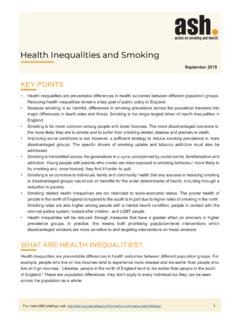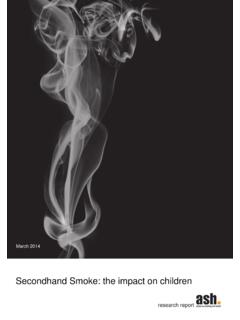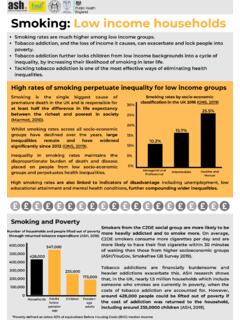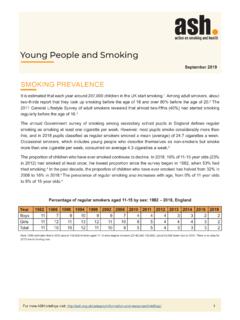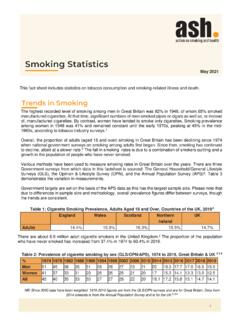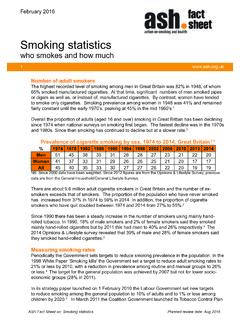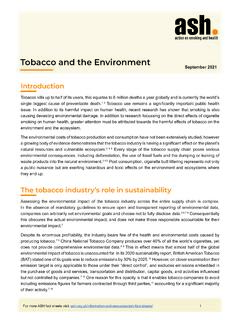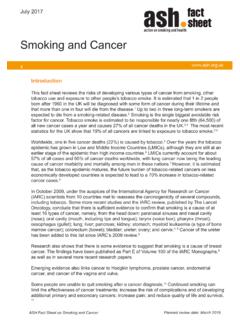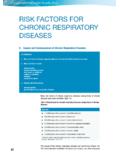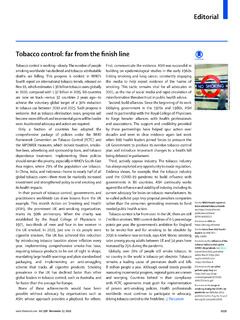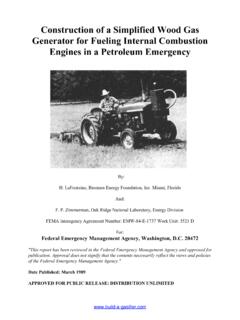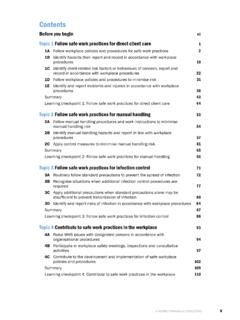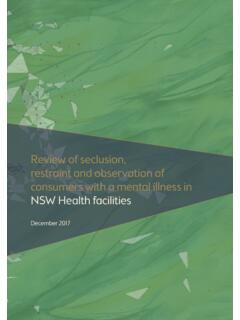Transcription of Smokefree Legislation
1 ASH Fact Sheet on Smokefree legislationPlanned review date: March 2017 Smokefree Legislation : The Health Act 2006 Smoking has been prohibited by law in virtually all enclosed and substantially enclosed work and public places throughout the United Kingdom since July 2007. Smokefree Legislation in England forms part of the Health Act 2006. Implementation followed the introduction of a similar law in Scotland in 20061,2 and regulations in Wales and Northern Ireland (April 2007). Under the Health Act, substantially enclosed means premises or structures with a ceiling or roof (including retractable structures such as awnings) and where there are permanent openings, other than windows or doors, which in total are less than half of the area of the walls. So, for example, bus stops can be required to be Smokefree if the shelter is substantially enclosed.
2 The law also applies to workplace vehicles which are used by more than one person at any details of the law including the detailed regulations can be accessed Legislation : The Childen and Families Act 2014 The Children and Families Act 2014, granted Royal Assent on 13th March 2014, gave the Secretary of State for Health powers to make private vehicles Smokefree when carrying children under the age of ,4 The provisions were introduced as Amendment 125 when the Bill was being debated in the Lords in The Amendment was accepted during a vote in the House of Lords on 29th January 2014 (by 222 votes to 197) and by MPs (376 in favour to 107 against) during a vote on 10th February. After a period of consultation, the regulations were passed in February 2015 and will be implemented on 1 October further information about smoking in cars please see ASH Factsheet: Smoking in CarsExemptions to the Health Act 2006 There are very few exemptions to the law and where they do exist they do not apply to the entirety of the premises but to designated rooms.
3 These include: Guest bedrooms in hotels and guest houses and certain rooms in care homes, hospices and prisons. Private homes. However, if part of a home is used as a workplace, for example a room set aside for childminding or music lessons, that room must be Smokefree . Where work is undertaken solely to provide personal care for a person living in the dwelling, to assist with domestic work or to maintain the building, the private dwelling is not considered to be a workplace and is exempt from the Smokefree Legislation . Places such as open air sports stadia are exempt. However the owners of such premises may choose to implement a Smokefree policy. Smokefree LegislationApril 201514 ASH Fact Sheet on Smokefree legislation2 Bus stops may be exempt if the shelter is not substantially enclosed.
4 In England, smoking by actors may be permitted if appropriate for the artistic integrity of the performance. This exemption does not apply to other countries of the United Kingdom. Offshore installations, such as oil rigs, may designate a room for smoking. Specialist tobacco shops. Exemptions are allowed only for the sampling of cigars or pipe tobacco and are subject to stringent conditions. Full details can be downloaded and Enforcement The owners or managers of premises are required to uphold the law by ensuring that no-one smokes where it is against the law to do so. In order to comply, they must take reasonable steps such as: Ensuring that staff, customers, visitors and members of the public are aware that premises and vehicles are legally required to be Smokefree Displaying the legally required no-smoking signs at all of the entrances to their buildings and inside their work vehicles.
5 Identifying areas inside their premises where smoking might be taking place and displaying additional no-smoking signs, or installing smoke detectors and alarms. Including the requirements in their personnel procedures and being prepared to use their disciplinary procedures if necessary. Local authorities have the power to enforce the Smokefree Legislation , although compliance with the law has been high and there has been little need for enforcement measures. OffencesOffences for which individuals can be fined or prosecuted occur when the law is not complied with in the following ways: Failure to display no-smoking signs Smoking in a Smokefree workplace, public place or vehicle Failure to prevent smoking in a workplace, public place or vehicleFull details about penalties see smoke - free (Penalties and Discounted Amounts) Regulations 2007.
6 Background to the legislationComprehensive reviews of the effects of passive smoking include reports by the US Surgeon General 6 7 National Health and Medical Research Council of Australia 8 US National Research Council 9 World Health Organization (WHO) 10 11 California Environmental Protection Agency (EPA) 12 International Agency for Research on Cancer (IARC). 13In addition, the UK Government s advisers, the Scientific Committee on Tobacco and Health, reported in November 2004 that exposure to secondhand smoke was a substantial public health hazard . 14 The report found that exposure to secondhand smoke increased a non-smoker s risk of contracting lung cancer and heart disease by around 25%. 14In 1998, the Government s White Paper, Smoking Kills proposed an Approved Code of Practice (ACOP) to supplement the Health and Safety and Work Act (HASAW) to protect workers from secondhand smoke , with an opt-out for the hospitality trade, which became known ASH Fact Sheet on Smokefree legislation3as the Public Places Charter.
7 This voluntary scheme was designed to encourage places such as restaurants and pubs to increase provision for non-smokers and improve overall air quality. Despite extensive publicity to promote the Public Places Charter, compliance with the initiative was low. A progress report published in April 2003 revealed that 46% of restaurants and pubs surveyed still allowed smoking throughout, with only 22% having separate smoking and non-smoking areas. Less than 1% banned smoking In November 2004, the Government published a White Paper on public health, which proposed to end smoking in the great majority of workplaces and public places except for private clubs and for pubs which did not serve Despite a public consultation which revealed overwhelming support for a comprehensive smoking ban, the Government retained the proposed exemptions for pubs and clubs when it published the Health Bill in late 2005.
8 However on 14 February 2006, MPs voted by a large majority to remove the exemptions for pubs and clubs. The bill also received majority support in the House of Lords and became law in July 2006. Why we need a Smokefree lawThe evidence that exposure to other people s smoke is dangerous to health is incontrovertible. It has been confirmed by the former Chief Medical Officer (CMO) Sir Liam Donaldson (in July 2003) as well as by the heads of all of Britain s thirteen Royal Colleges of Medicine (in November 2003), and by the former Scottish CMO Dr Mac Armstrong (in April 2004). Prior to the implementation of the Smokefree law, it was estimated that exposure to secondhand smoke in the workplace caused around 617 premature deaths in the UK each By comparison, the total number of deaths in the UK from all other industrial accidents was reported to be 235 in 2003 The degree of risk depends on the extent and duration of exposure.
9 Particularly at risk were bar staff, casino workers and other employees in workplaces where smoking was routine. It was estimated that secondhand smoke caused one premature death a week among workers in the hospitality Public support for Smokefree legislationOpinion polls show that public support for Smokefree Legislation is strong and has continued to rise since the law came into effect in of surveySupport for Smokefree Legislation - adults in England (%)May 2004 (MORI)51 Dec 2005 (YouGov)66 May 2007 (YouGov)72 Feb 2008 (YouGov)76 Mar 2010 (YouGov)80 Mar 2014 (YouGov) 82 The Smoking-Related Behaviour and Attitudes Survey for 2008/09 found the following high level of support for smoking restrictions among adults in Great Britain: 85 per cent agreed with restrictions on smoking at work.
10 93 per cent in restaurants. 91 per cent in indoor shopping centres. 94 per cent in indoor sports and leisure centres. 85 per cent in indoor areas at railway and bus stations. 94 per cent in other public places such as banks and post offices. 75 per cent in ASH Fact Sheet on Smokefree legislation4 There is also strong support for Legislation prohibiting smoking in cars with children: A 2010 poll commissioned by Cancer Research UK found 75% support for Legislation banning smoking in cars with A poll conducted for ASH Scotland found that over 80% of adults in Scotland would support this Legislation . 21 A poll by the Royal College of Physicians found that 77% of adults in England would support a total ban on smoking in motor vehicles carrying children under the age of 18 A YouGov poll published by the Faculty of Public Health in August 2010 found 74% support for a ban on smoking in cars with By 2014, a poll commissioned by ASH found that this figure had risen to 77%.
